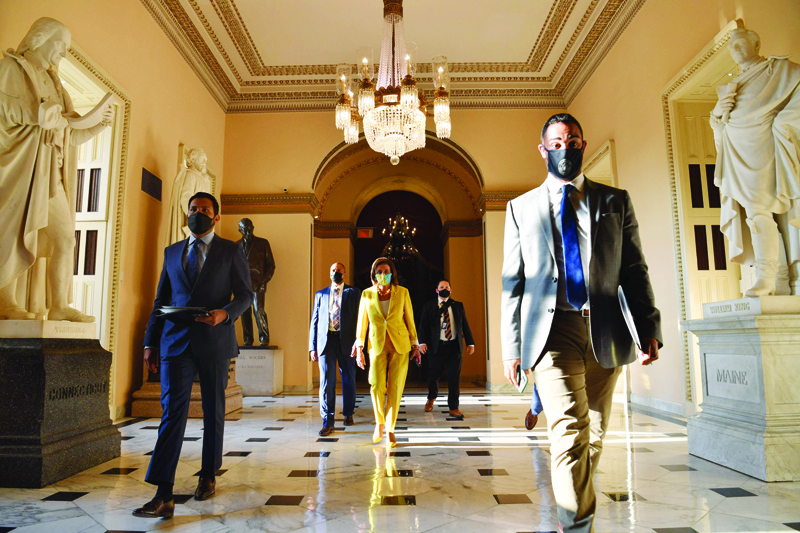 WASHINGTON: US House Speaker Nancy Pelosi (C) walks to hold a press conference following the House vote at the US Capitol in Washington, DC. President Joe Biden's plans to spend nearly $5 trillion to change the world's largest economy advanced in the House of Representatives on Tuesday, after Democratic leaders reached an agreement with centrist lawmakers to end a dispute threatening the bills. - AFP
WASHINGTON: US House Speaker Nancy Pelosi (C) walks to hold a press conference following the House vote at the US Capitol in Washington, DC. President Joe Biden's plans to spend nearly $5 trillion to change the world's largest economy advanced in the House of Representatives on Tuesday, after Democratic leaders reached an agreement with centrist lawmakers to end a dispute threatening the bills. - AFP
WASHINGTON: US President Joe Biden's plans to spend nearly $5 trillion to change the world's largest economy advanced in the House of Representatives on Tuesday, after Democratic leaders reached an agreement with centrist lawmakers to end a dispute that threatened the bills. Biden and his Democratic allies controlling the chamber are pushing for passage of both a $1.2 trillion overhaul to the country's infrastructure and a bill costing $3.5 trillion over 10 years that would pay for improvements to education, health care and climate change resiliency.
While the infrastructure bill has already won passage in the Senate with some votes from Republicans, Democrats have found no opposition support for the second, larger bill, and were planning to approve it with their votes alone -- a tough task given their narrow majorities in both chambers of Congress. The dispute erupted when centrist Democrats in the House said the infrastructure bill must be voted on first, but on Tuesday, those lawmakers backed a compromise resolution that would see the infrastructure measure put to a vote in about a month.
"I am committing to pass the bipartisan infrastructure bill by September 27. I do so with a commitment to rally House Democratic support for its passage," House Speaker Nancy Pelosi said in a statement. The resolution paves the way for further negotiations over the $3.5 trillion measure with the aim of unveiling it by September 15. The Democrats can afford to lose no votes in the Senate, where two of their lawmakers have already said they won't vote for the bill unless its price is reduced. Final votes on the bills are not expected until next month or later in the fall.
The infrastructure measure includes $550 billion in new spending and is aimed at revitalizing and expanding the nation's roads, railways, bridges and broadband access. The $3.5 trillion measure is supported by the Democratic leaders and its progressive faction, and includes funding for climate measures, infrastructure investments left out of the other bill, residency status for millions of migrant workers, and two years of paid tuition at public universities.
Meanwhile, a White House cybersecurity gathering including Big Tech executives was set yesterday to unveil steps aimed at improving cybersecurity following high-profile attacks which raised questions about the vulnerability of so-called critical infrastructure. President Joe Biden and key cabinet officials were to host the chief executives of Apple, Google, Amazon and Microsoft along with leaders from the finance and utilities sectors, a senior administration official said. The gathering comes after hacks and data breaches which have targeted a major US oil pipeline, a meatpacking company, and the Microsoft Exchange email system as well as ransomware attacks hitting various sectors.
"You will definitely be seeing a set of concrete announcements," the official told journalists in a background briefing. The recent attacks "has created a sense of urgency" and the need to refocus attention of government and the private sector, the official added. "We want to focus on the root causes of any malicious (cyber) activity," the official said.
This means ensuring more robust systems of computer software and hardware in both government and industry. "We need to transition to a system where security is there by default," the official said. The latest attacks, which affected Microsoft email servers and the widely deployed SolarWinds security software, raise questions about protecting 16 "critical infrastructure" sectors including energy, utilities, defense, food and manufacturing.
Some analysts have called for tougher sanctions against Russia and other countries accused of harboring cybercriminals. Others have suggested more scrutiny of cryptocurrency which is used by hackers to collect ransomware. Expected at the meeting were CEOs Sundar Pichai of Google, Andy Jassy of Amazon, Tim Cook of Apple and Satya Nadella of Microsoft.
Also invited were the top executives of JPMorgan Chase, Bank of America and other finance and insurance companies, as well as the heads of water and energy companies and educational organizations. Government leaders include Commerce Secretary Gina Raimondo, Energy Secretary Jennifer Granholm, Homeland Security Secretary Alejandro Mayorkas and top cybersecurity advisers. - AFP
.jpg)



